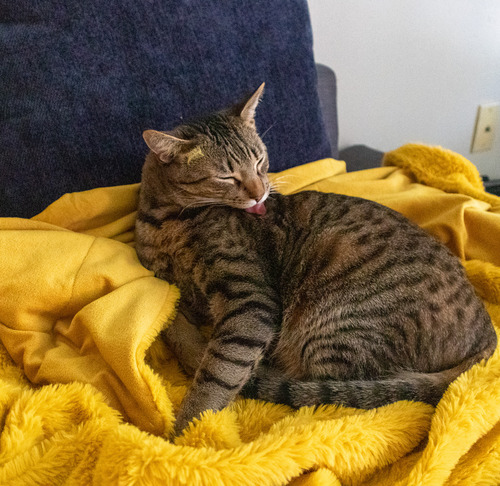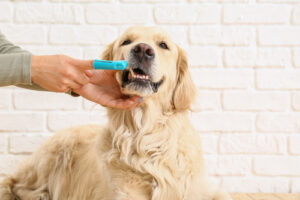Noticing your cat’s hair falling out can be worrying, especially when you’re used to seeing their coat look shiny and full. Whether it’s a small bald patch or thinning across larger areas, changes in your cat’s fur often raise questions about their health and comfort. While shedding is normal, excessive hair loss usually points to something more. In this blog, we’ll explore the most common reasons behind cats’ hair falling out, what signs to look for, and how a veterinary visit can help uncover the cause so your feline can get back to feeling their best.
Common Reasons for Cats Hair Falling Out
Cats may experience hair loss, also called alopecia, for different reasons. While shedding is natural, patchy fur or excessive hair loss often signals something more. Understanding the possible causes helps pet owners recognize when it’s time to schedule an exam.
Allergies and Skin Sensitivities
One of the leading causes of cats’ hair falling out is allergies. Cats can react to food, flea bites, or environmental triggers such as pollen and dust. These allergic responses often cause intense itching, which leads cats to scratch or groom excessively, resulting in bald spots. Some cats may also develop red or irritated skin where the fur has thinned.
Parasites and External Irritations
Fleas, mites, and lice are another reason for cats’ hair falling out. Even a single flea bite can make a sensitive cat scratch excessively. Mites and lice may also irritate the skin, causing discomfort and fur loss. Regular preventive care and checkups help identify these pests early.
Stress and Behavioral Over-Grooming
Cats sometimes respond to stress by over-grooming. When grooming becomes excessive, bald spots form on areas like the belly, legs, or sides. Changes in the household, new pets, or other stressors may contribute to this behavior. If stress is the root cause, hair loss often looks different than naturally occurring shedding.
Medical Conditions That Cause Cats’ Hair Falling Out
While allergies and parasites are common, sometimes hair loss signals a medical condition that requires attention. Your veterinarian can perform diagnostics to determine whether a health problem is contributing to the issue.
Hormonal Imbalances
Cats with thyroid or hormonal conditions may lose fur in symmetrical patterns. Unlike patchy bald spots from scratching, these patterns suggest something internal rather than external. A blood test helps your veterinarian detect if hormones are to blame for cats’ hair falling out.
Infections of the Skin
Both bacterial and fungal infections may cause cats to lose hair. A well-known fungal infection, ringworm, can leave circular bald patches. These conditions require veterinary care to diagnose and manage effectively.
Genetic Predispositions
Some breeds are more prone to hair thinning. While most cats have naturally full coats, certain genetic factors can cause thinning or patchy hair. Your veterinarian can help confirm whether a cat’s hair loss is breed-related or caused by another issue.
How Veterinarians Diagnose Cats’ Hair Falling Out
If your cat’s coat is looking thin, a veterinary exam is the best way to uncover the cause. At Dix Hills Animal Hospital in Huntington, NY, our team uses a combination of medical history, physical exams, and diagnostic testing to find answers.
Physical Examination
Your veterinarian starts by checking your cat’s skin and coat closely. This exam may reveal parasites, redness, bumps, or lesions that point to the cause of the hair loss.
Diagnostic Testing
Depending on what’s found, further testing may include skin scrapings, fungal cultures, or blood tests. These help rule out infections, parasites, or internal health conditions that contribute to your cat’s hair falling out.
Reviewing Lifestyle and Environment
Since stress can also cause cats to over-groom, your veterinarian may ask about recent changes at home, such as new pets, moves, or family schedule adjustments. These insights help determine whether behavior is playing a role.
When to Call Your Huntington Vet About Cats’ Hair Falling Out
Pet owners may wonder whether hair loss is normal shedding or something more serious. A good rule of thumb is to schedule an appointment if you notice bald patches, irritated skin, or persistent scratching.
Signs That Require Veterinary Attention
- Bald patches or thinning fur in specific areas
- Excessive licking, scratching, or chewing
- Red, scaly, or flaky skin
- Hair loss combined with weight loss or lethargy
- Open sores or lesions on the skin
These signs suggest that your cat’s hair falling out may be linked to a medical condition, not just natural shedding. The sooner your cat is examined, the sooner treatment can begin.
Can Cats Hair Falling Out Be Prevented?
While some causes of hair loss are unavoidable, preventive care goes a long way in protecting your cat’s coat.
Routine Veterinary Exams
Annual or semi-annual exams allow veterinarians to catch early signs of skin or health problems. Regular checkups provide peace of mind and help keep your cat comfortable.
Parasite Prevention
Keeping your cat on year-round parasite protection helps reduce the risk of fleas, mites, and other pests that often cause cats’ hair falling out.
Stress Reduction Strategies
Cats thrive on routine. Minimizing changes in their environment and providing enrichment through toys, scratching posts, and safe hiding spots can reduce stress-related over-grooming.
The Importance of Veterinary Care for Cats Hair Falling Out
Hair loss in cats is rarely something to ignore. Since so many different causes exist, from allergies to infections, a veterinary exam is the most effective way to understand why your cat’s hair is falling out. At Dix Hills Animal Hospital in Huntington, NY, our compassionate team is here to help uncover the reason and provide support tailored to your cat’s needs. If you notice your cat’s hair falling out, call Dix Hills Animal Hospital at (631) 271-8383 or book an appointment online today. Our experienced team will guide you through the process and help your cat feel comfortable again.





